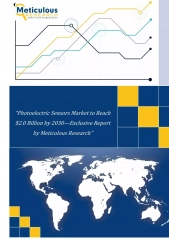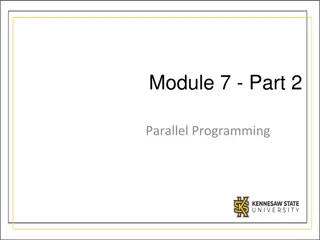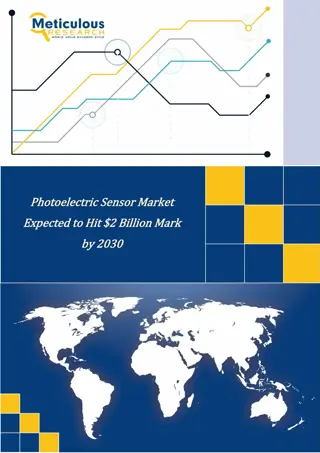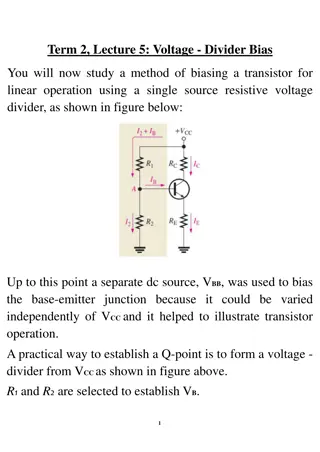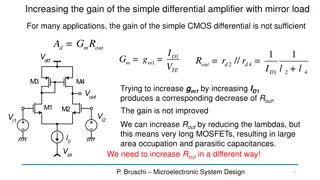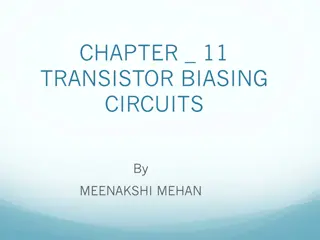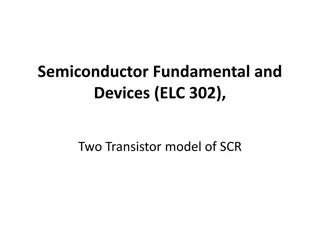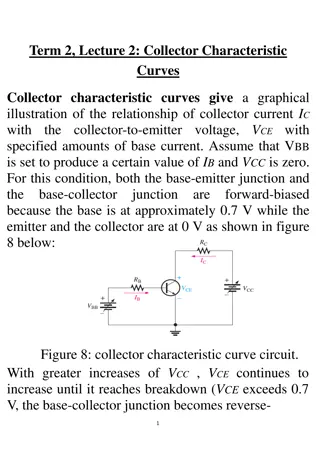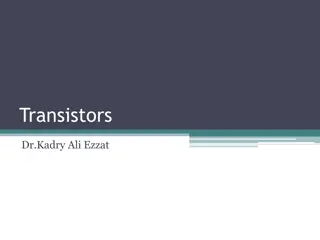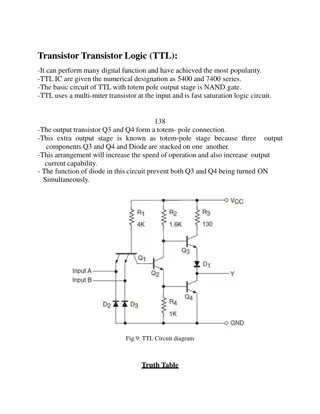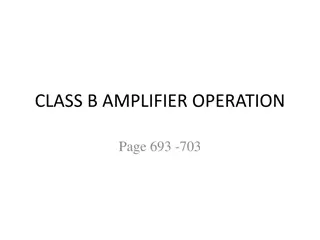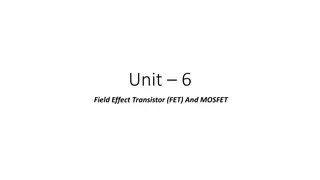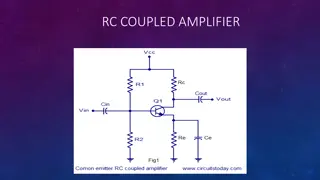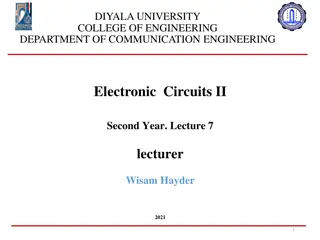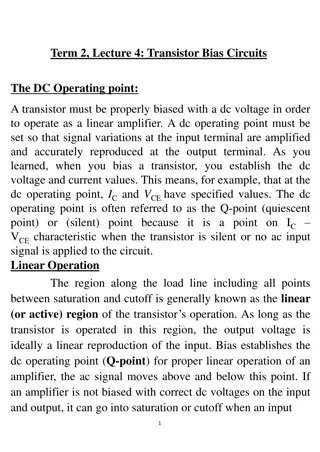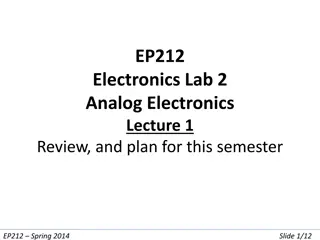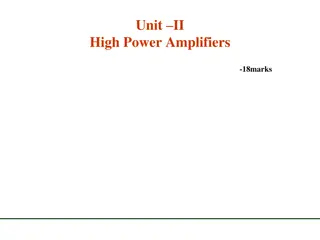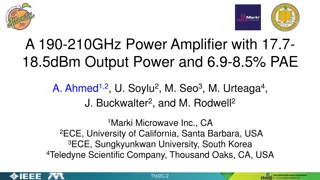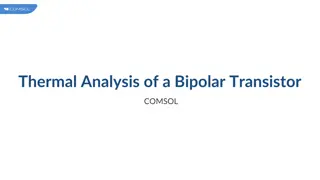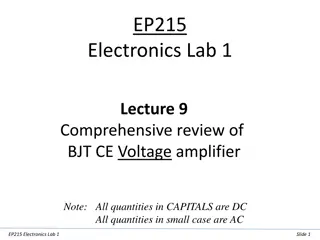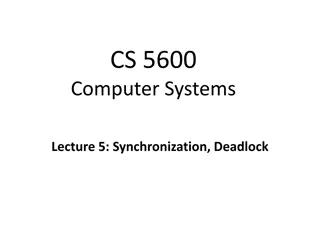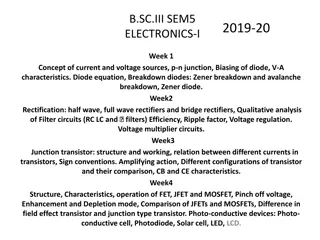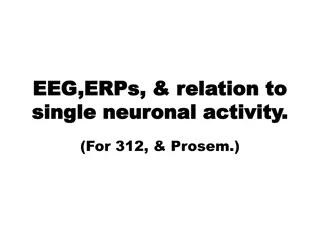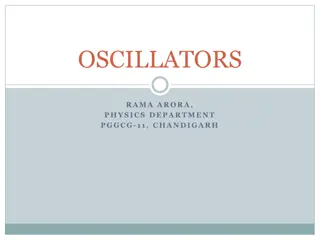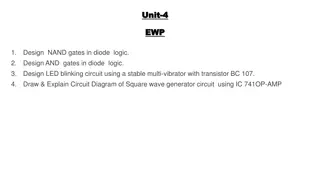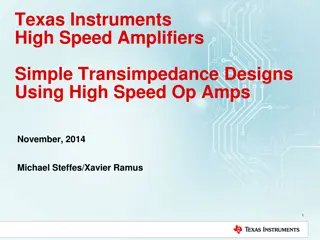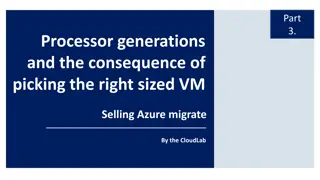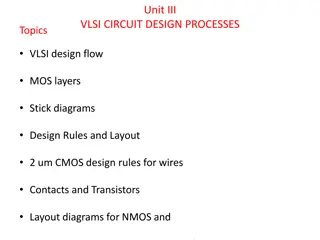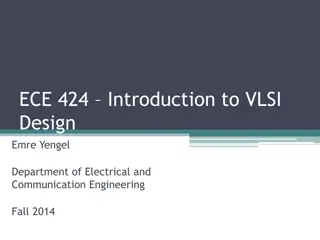Photoelectric Sensors Market to Reach $2.0 Billion by 2030—Exclusive Report by Meticulous Research
Photoelectric Sensors Market by Sensing Type (Diffuse-reflective Sensors, Retro-reflective Sensors), Sensing Distance, Structure (Amplifier Built-in, Power Supply Built-in), Beam Source, Output, End Use, and Geography - Global Forecast to 2030\n
1 views • 5 slides
Evolution of Parallel Programming in Computing
Moores Law predicted the doubling of transistor capacity every two years, benefitting software developers initially. However, hardware advancements can no longer ensure consistent performance gains. Parallel computing, leveraging multicore architecture, has emerged as a solution to optimize performa
7 views • 10 slides
Photoelectric Sensor Market
This comprehensive market analysis delves into the diverse landscape of photoelectric sensors, considering various parameters such as sensing type (including diffuse-reflective sensors and retro-reflective sensors), sensing distance, structure (with options like amplifier built-in or power supply bu
0 views • 4 slides
Logic Families
Logic families such as Diode Logic (DL), Resistor-Transistor Logic (RTL), and Diode-Transistor Logic (DTL) each have distinct capabilities and limitations when it comes to performing logic functions. While DL gates are simple and inexpensive but limited in functionality, RTL gates offer both normal
1 views • 22 slides
Understanding Voltage Divider Biasing in Transistors
Study how to bias a transistor for linear operation using a resistive voltage divider connected to a single source. Learn the design principles, loading effects, stability considerations, and how to calculate key parameters for a successful voltage divider bias circuit.
0 views • 9 slides
Techniques to Increase Gain in a Simple Differential Amplifier
Explore methods to boost the gain of a simple CMOS differential amplifier by replacing the current mirror with a cascode mirror, adding a common-gate stage, and employing a cascode differential amplifier. These techniques help improve Rout without extensive use of long MOSFETs, optimizing the amplif
2 views • 30 slides
Transistor Biasing Circuits: A Comprehensive Overview
Biasing is crucial for the proper functioning of transistor circuits, ensuring they operate in the active region as amplifiers. This process involves setting DC voltages to establish the correct operating conditions for the transistor. By providing the necessary biasing, amplification of small input
0 views • 41 slides
Introduction to Uni-Junction Transistor (UJT) in Electronic Semiconductors
Uni-Junction Transistor (UJT) is a semiconductor switching device with unique characteristics, such as regenerative emitter current increase when triggered, leading to a negative resistance region. It finds applications in sawtooth and pulse generation, switching, and triggering SCRs & TRIACs. The U
0 views • 15 slides
Understanding the Two-Transistor Model of SCR for Beginners
Explore the two-transistor analogy of SCR, a method illustrating SCR as a combination of PNP and NPN transistors. Discover how the working principle is easily explained through this model, showcasing the transition from off to on state when triggering the SCR. Uncover the accumulative action of curr
0 views • 8 slides
Understanding Transistor Operation through Collector Characteristic Curves
Collector characteristic curves provide insight into the transistor's operation in various regions such as cutoff, saturation, and active. By analyzing the relationship between collector current (IC) and collector-to-emitter voltage (VCE) with base current variations, one can understand how a transi
0 views • 7 slides
Understanding Bipolar Transistor Configurations for Electronic Circuits
Explore the three common configurations - Common Base, Common Emitter, and Common Collector - for Bipolar Transistors in electronic circuits. Each configuration offers unique characteristics such as voltage gain, current gain, and impedance levels, impacting the signal processing and amplification c
0 views • 27 slides
Understanding Transistor-Transistor Logic (TTL) Circuits
Transistor-Transistor Logic (TTL) is a popular digital circuit technology known for its speed and reliability. This technology utilizes totem pole output stages for efficient performance. TTL logic gates have varying characteristics like power dissipation and speed, making them suitable for differen
0 views • 5 slides
Efficient Class B Amplifier Operation and Power Calculation
Class B amplifiers offer greater efficiency compared to single transistor Class A operation. This article covers the push-pull operation of Class B transistors, input DC power calculations, connecting push-pull amplifiers to loads, output AC power measurement, efficiency calculation, and power dissi
0 views • 28 slides
Evolution of Operating Systems: A Historical Overview
Operating systems have evolved significantly over the years, starting from single-program machines to modern multi-programming systems. The journey includes the development of batch systems, introduction of multiprogramming, and advancements in memory management techniques. Key milestones such as th
0 views • 35 slides
Understanding Practical Op-Amp Circuits: Inverting, Noninverting, and More
Explore practical op-amp circuits such as inverting amplifier, noninverting amplifier, unity follower, summing amplifier, and integrator. Learn how to calculate output voltages for various configurations and understand their applications with examples.
0 views • 17 slides
Evolution of Semiconductor Devices in Modern Electronics
The lecture discusses the fundamentals of semiconductor drift and diffusion currents, diode behavior, transistor characteristics, and amplifier circuits in ECE 255. It explores the origins of modern electronics, from the invention of the bipolar transistor to the evolution of electronic devices thro
0 views • 35 slides
Understanding Field Effect Transistor (FET) and MOSFET Principles
Explore the construction, principles, characteristics, and relationships among parameters of Junction Field Effect Transistors (JFET) through detailed explanations and diagrams. Dive into the equation of drain characteristics and the resemblance to a parabolic curve. Understand the differentiation p
0 views • 9 slides
Understanding RC Coupled Amplifiers and Transistor Basics
Amplification is the process of increasing signal strength without changing its characteristics. An RC coupled amplifier is a multistage amplifier using resistors and capacitors. Transistor amplifiers amplify signals based on transistors with different configurations. The common emitter configuratio
0 views • 23 slides
Transistor Tuned Amplifiers: Operation and Analysis
Transistor tuned amplifiers consist of a parallel tuned circuit as the collector load, amplifying a specific frequency while rejecting others. The resonant frequency of the tuned circuit is crucial for amplification. A high Q circuit offers maximum voltage gain at the resonant frequency but decrease
0 views • 30 slides
Understanding Transistor Bias Circuits for Linear Amplification
Transistor bias circuits play a crucial role in setting the DC operating point for proper linear amplification. A well-biased transistor ensures the signal variations at the input are accurately reproduced at the output without distortion. Various biasing methods such as Voltage-Divider Bias, Emitte
0 views • 7 slides
Analog Electronics Review and Semester Plan for EP212 Spring 2014
This presentation reviews concepts in analog electronics, focusing on operational amplifiers, feedback, signal measurement in the presence of noise, transistor amplification, differential operation constraints, and component matching in electronics labs. The semester plan includes topics such as dis
1 views • 11 slides
Understanding High Power Amplifiers with BJT for Efficient Performance
Explore the world of high-power amplifiers utilizing BJT technology, focusing on factors like linearity, efficiency, and maximum power capability. Learn about different amplifier classes - A, B, AB, and C - each with unique operating characteristics. Discover the significance of amplifier efficiency
0 views • 22 slides
High-Efficiency Power Amplifier Design for 190-210GHz Range
Optimizing for high efficiency at OP1dB, this work presents a power amplifier operating in the 190-210GHz range with an output power of 17.7-18.5dBm and PAE of 6.9-8.5%. Utilizing a 250nm InP HBT process, the amplifier integrates four stages and demonstrates a gain of approximately 23dB. Key design
0 views • 26 slides
Evolution of Intel Microprocessors: From 4004 to Pentium 4
Explore the history of Intel microprocessors, from the groundbreaking 4004 and 8008 to the evolution of 16-bit and 32-bit processors like the 8086 and the Pentium 4. Discover how Moore's Law has driven advancements in transistor count and processing capabilities in the world of microprocessors.
0 views • 39 slides
Emerging Materials for MOS-Transistor Gate Stacks in Semiconductor Technology
Advancements in semiconductor technology necessitate the adoption of new materials for gate stacks in MOS-transistors, addressing issues like gate leakage current and gate oxide problems. With the continual scaling down of MOSFETs, the use of high-K materials offers solutions to enhance performance
0 views • 51 slides
Thermal Analysis of a Bipolar Transistor Using COMSOL
This model utilizes a COMSOL simulation to analyze the thermal behavior of a bipolar transistor. The heat transfer within the device is calculated to determine the temperature distribution. Various plots, such as the Gummel plot and current gain curve, illustrate the collector and base currents as f
1 views • 11 slides
Comprehensive Review of BJT CE Voltage Amplifier in Electronics Lab
This lecture provides a comprehensive review of the BJT CE voltage amplifier circuit, starting with theoretical concepts and moving towards practical implementations. It covers the operation of the BJT as a switch, the addition of resistors for current control, DC design considerations, AC voltage g
0 views • 19 slides
Layout and Electrical Rules Check by KANTHARAJU P.K.
Layout rules check is essential in preparing masks for fabrication processes to ensure accuracy. Key design rules include minimum width, spacing, enclosure, and extension. Electrical rules checking (ERC) methodology is used to verify design robustness against electronic design rules at schematic and
0 views • 15 slides
Understanding Parallelism in Computer Systems
This content delves into various aspects of parallelism in computer systems, covering topics such as synchronization, deadlock, concurrency vs. parallelism, CPU evolution implications, types of parallelism, Amdahl's Law, and limits of parallelism. It explores the motivations behind parallelism, diff
0 views • 48 slides
Advanced Topics in B.Sc III Semester 5: Electronics, Condensed Matter Physics, Nuclear and Radiation Physics
Explore advanced concepts in Electronics-I like current and voltage sources, p-n junctions, diode biasing, rectification techniques, and transistor characteristics. Delve into Crystal Structure and Crystal Diffraction in Condensed Matter Physics, and learn about nuclear forces, radioactivity, and nu
0 views • 24 slides
Understanding the Relationship between EEG, ERPs, and Single Neuronal Activity
This detailed information discusses the relationship between EEG, ERPs, and single neuronal activity, exploring how electrodes record signals based on tip diameter and biological amplifier filter settings. It delves into parameters that determine what an electrode records, highlighting the importanc
0 views • 56 slides
Understanding Oscillators: Basics and Operations
Oscillators are vital electronic devices that convert DC power to AC power without external input. They consist of components like the tank circuit, transistor amplifier, and feedback circuit. Learn about the classification, fundamental principles, feedback oscillators, and tuned collector oscillato
0 views • 24 slides
Exploring Diode and Transistor Logic Circuits for LED Blinking and Logic Operations
Dive into the world of diode and transistor logic circuits with designs for NAND and AND gates, as well as LED blinking circuits using stable multi-vibrators. Learn how these circuits function and discover the components involved in creating a square wave generator. Explore the practical application
0 views • 9 slides
High-Speed Amplifiers: Design Techniques and Considerations
This detailed document explores the design aspects of high-speed amplifiers, focusing on transimpedance designs using high-speed op-amps. It covers basic and advanced design issues, frequency response analysis, and key considerations for achieving desired performance. The content emphasizes simplifi
0 views • 44 slides
Understanding Processor Generations and VM Sizing for Azure Migration
Exploring the impact of processor generations on CPU performance, factors like clock speed, instruction set, and cache size are crucial. Choosing the right-sized VM plays a vital role in optimizing Azure migration. Passmark CPU Benchmark results provide insights on Intel processor generations for Az
0 views • 9 slides
Understanding MOSFET: Basics and Applications
MOSFET, or Metal Oxide Semiconductor Field Effect Transistor, is a key component in modern electronics. This presentation by Poonam Sharma covers the working principles, types, and applications of MOSFETs. Exploring the insulated gate feature, voltage control, and construction details, it explains h
0 views • 12 slides
DC Motor Control Techniques and Configurations
This chapter delves into various aspects of PWM and DC motor control, exploring characteristics of selected DC motors, rotation mechanisms, H-bridge configurations for motor direction control, logic configurations for motor operation, bidirectional motor control using an L298 chip, pulse width modul
0 views • 27 slides
Understanding Stick Diagrams in VLSI Circuit Design
Stick diagrams in VLSI design help visualize the layout of components on silicon by capturing topography and layer information through color codes or monochrome encoding. They serve as an interface between symbolic circuits and actual layouts, facilitating the planning of layout and routing while de
0 views • 27 slides
VLSI Design Methodologies and Layout Rules: A Comprehensive Overview
This detailed content provides an in-depth exploration of VLSI design methodologies and layout rules, focusing on topics such as standard cell layout methodology, transistor dimensions, design rules for n-well process, and more. The information covers important aspects like minimum widths, spacings,
0 views • 35 slides
FX-Audio DAC X6 Overview and Teardown Analysis
FX-Audio DAC X6 is a digital-to-analog converter with a built-in amplifier designed for higher impedance headphones like the Drop K7XX. The device features multiple inputs including Optical, USB, and Digital Coax, with outputs to line-out RCA ports and headphones. A breakdown of the internal compone
0 views • 4 slides
